
Double-check: Is it really an expiration date?
Not every date you see on your food is an expiration date. Here are four common food label dates you may see in the grocery store and what they really mean, according to U.S. Department of Agriculture (USDA):
- Sell-by date: How long the store can display the product
- Use-by date: The last date that the product is at peak quality
- Best if used by date: The best date for flavor and quality
- Closed by date or coded dates: The numbers and letters used by the manufacturer to indicate the day and time the product was packed
None of these are expiration dates nor do they indicate whether food is safe to eat or not. In fact, the FDA allows manufacturers to sell almost any food past these dates, with baby formula being the exception. What’s more, manufacturers aren’t required to put any of these dates on their food; the decision is totally up to them. But, if it’s any consolation, the FDA realizes these labels are confusing and would like the food industry to move to one standard phrase: “Best if used by.”
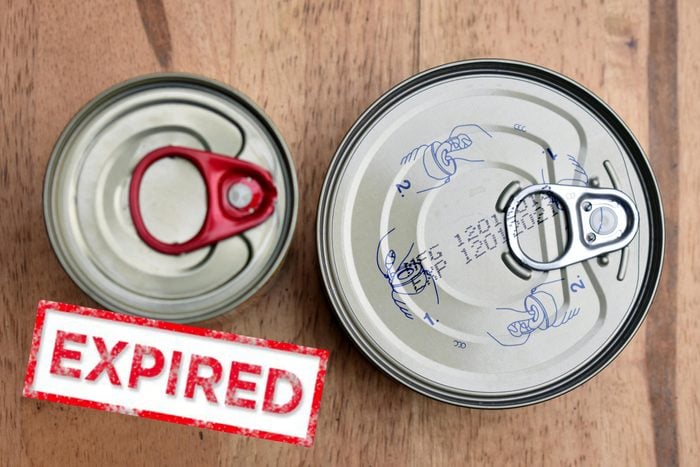
Why food expiration dates matter
Looks and smells can sometimes be deceiving—taking a whiff of the milk carton is not an exact science— which is why those expiration dates stamped on the packaging can guide you in the right direction and help prevent illness. From creamy cheeses to sandwich staples, it’s best to toss these foods once they’re past their given expiration date unless you want to roll the dice on an extra sick day.
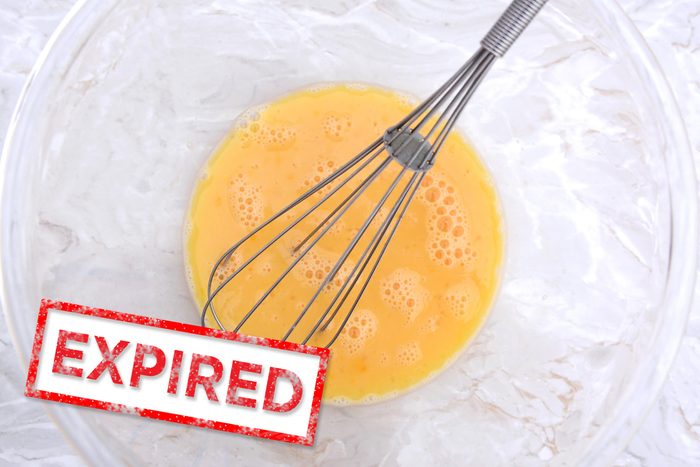
Egg substitutes
A full carton of eggs has a little more leeway than their boxed substitutes, but both should be consumed in a timely manner. If you’re debating whether to finish off that two-week-old carton of whites—don’t. “It’s very safe to keep eggs in the refrigerator for three to five weeks if they’re raw and in the shell. For egg substitute products, you have about three to five days on average once they’re open. If they’re unopened you have about 10 days,” says Jessica Crandall, RDN, a Denver-based registered dietitian, certified diabetes educator, and national spokesperson for the Academy of Nutrition and Dietetics.
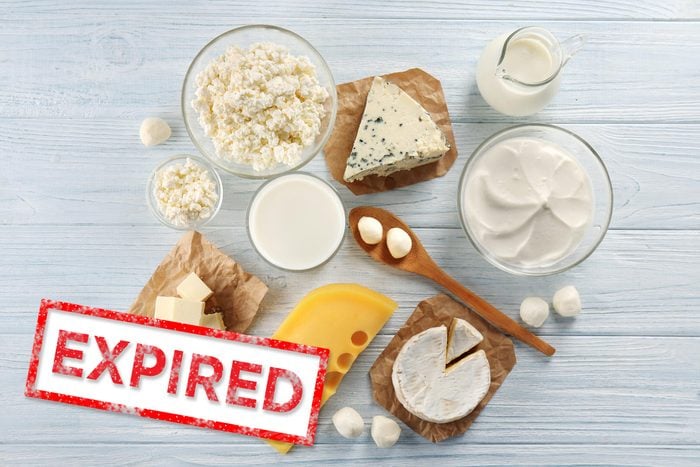
Soft cheeses
Harder cheeses like cheddar or gouda have a longer shelf life in the fridge because it’s more difficult for bacteria and mold to permeate them. Once opened, though, hard and processed cheeses last about three to four weeks, according to the Academy of Nutrition and Dietetics—and you can cut out a one-inch square around a small moldy area and use the rest of the cheese if you have to. However, softer cheeses like ricotta, cream cheese, or goat cheese, are more susceptible to bacteria and should be tossed at the first sign of spoiling or once the expiration date has passed, whichever comes first. As a general rule of thumb, the softer the cheese, the shorter the shelf life, so two weeks max for cream cheese and one week for ricotta, say the experts at the Academy of Nutrition and Dietetics.
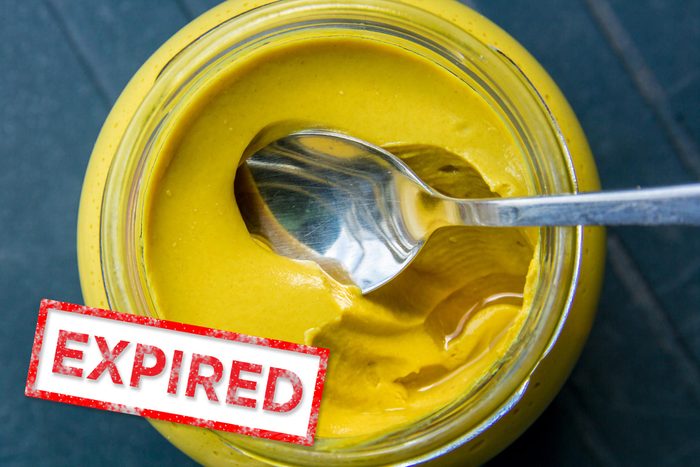
Jarred condiments
It may seem like spreads and sauces last forever, but just because they’re in a glass jar tucked away in the cool refrigerator doesn’t mean they’re untouchable by bacteria. “Once you’ve opened the lid, that safety seal is broken, and you should be using that condiment in a timely fashion,” says Crandall. “In addition, as we make sandwiches for example, we dip our knife into the spread container and wipe it onto the sandwich and then dip it back into the container. By doing this you’re putting some of that bacteria back into the container.” Mustard can last up to a year in the fridge, but chuck the salsa after 1 month, mayo after 2, BBQ sauce after 4 months, and ketchup after 6, according to New York’s Department of Agriculture. But if you notice any water floating on top, discoloration, or weird smells—just toss it no matter how long it’s been refrigerated.
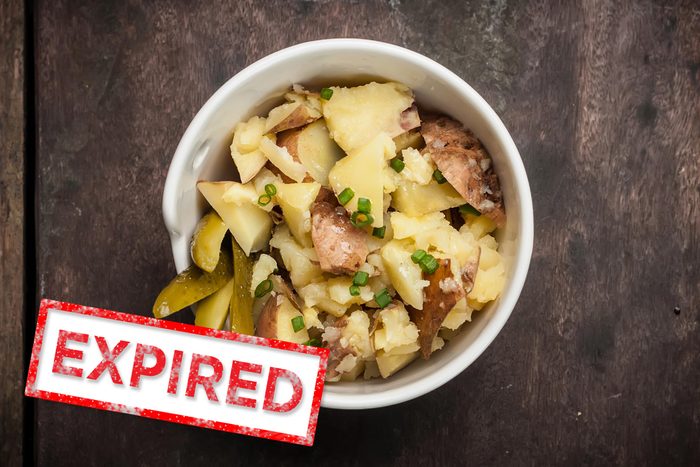
Potato salad
Similar to jarred spreads, potato, tuna, or egg salads are more susceptible to bacterial growth because they have more instances of exposure—say, when you just take a few scoops at a time from the container or simply forget that the salad has been sitting there for days. And once your pasta salad has been contaminated, you’re more at risk for food poisoning. “Our food system is very safe, but sometimes when things fall out of temperature or if there is bacteria introduced, we have to be extra cautious with those things,” says Crandall. So toss deli or homemade salads after three to five days, warns the USDA.
If You Don’t Eat Sweet Potatoes Every Day, This Might Convince You to Start
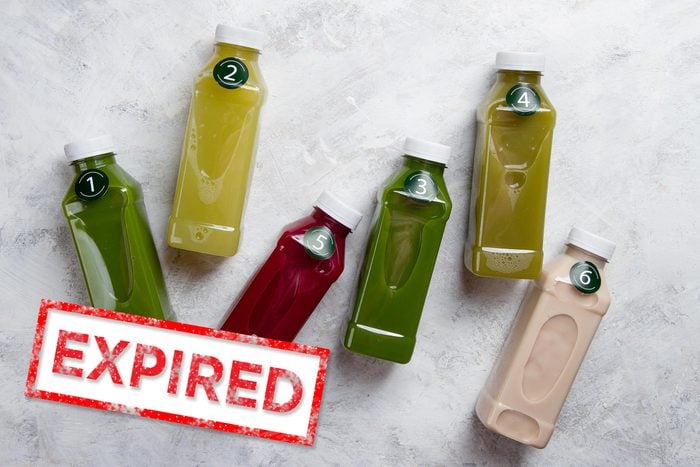
Cold-pressed juice
Green juices may be filling up your Instagram feeds daily, but raw versions should not find a permanent home in your refrigerator. Raw, untreated juices are incredibly popular among the health-conscious because they’re nutrient-dense, but it’s important to consume them very soon after buying. Unlike typical processed juices which undergo pasteurization to kill off harmful bacteria and increase shelf life, these raw juices are not pasteurized, making them much more prone to bacterial contamination. Some cold-pressed juices are treated with high pressure processing, sometimes called cold pasteurization. This can extend the shelf life of fresh juice to about 30 days, and they’re usually fine when refrigerated properly for five days after opening. Be sure to check a product’s label for the use by date and handling instructions.
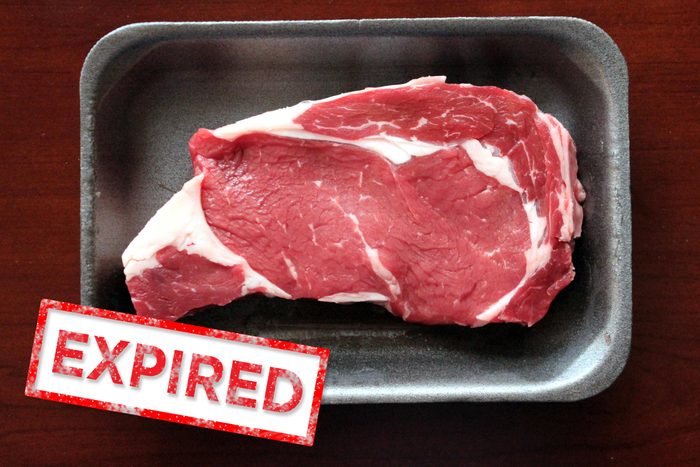
Fresh meat
With fresh meat you’re usually dealing with a “sell by” date, which tells the store the last day it can keep that product out for sale. What does this mean for you? You either need to eat it or freeze it when you get home. “The ‘sell by’ is telling the store when it should be the last day to have it on their shelf. They may even be discounting the food to try to get rid of it if it’s the last day they can have it on their shelves,” says Crandall. A lot of fresh raw meat is also contaminated with Salmonella, E. coli, or other bacteria. With that in mind, it’s very important to cook the meat at the proper temperatures as a greater defense against bacteria.
Sustainable Meat: The Best and Worst Kinds, Ranked by Sustainability Experts
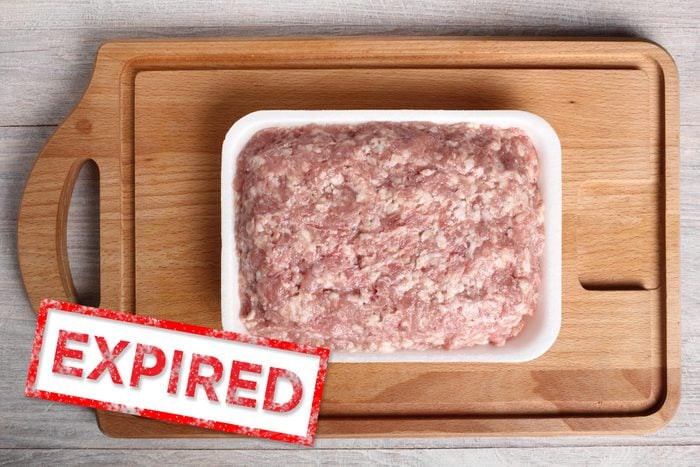
Ground meats
The USDA says that ground meat should be eaten or frozen within two days of purchase—whether it’s beef, pork, turkey, lamb, and any other type. Because it’s ground, the bacteria that were originally present on the surface can be mixed throughout the meat, increasing your risk of contracting food poisoning or another illness.
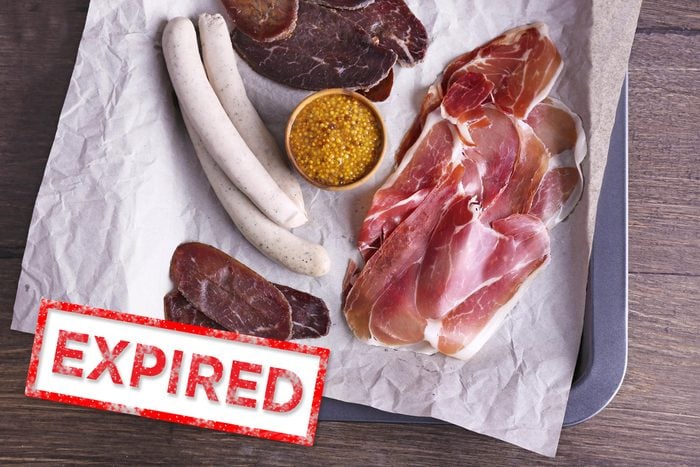
Deli meat
Take your ticket, but don’t load up too much at the deli counter. Those ham and turkey slices will only last about three to five days, according to the USDA, so it’s important to only buy what you’ll realistically eat during that period. Prepackaged deli meats sold in air-tight packaging will last two weeks longer than the fresh-sliced varieties if they’re unopened, but as soon as you crack the seal you’re working with the same three- to five-day consumption window for safe eating. Deli meat in particular is susceptible to a certain kind of bacteria called Listeria, which can multiply in cold environments like your refrigerator, so just because it’s cold doesn’t mean it’s completely protected. You can’t see, smell, or taste some of the bacteria that can make you sick. But if the deli meat is a little slimy or giving off a funky smell, then that’s a good sign it needs to go. Also check that your fridge’s thermometer is set to below 40 degrees Fahrenheit.

Fish
Fish are no less prone to bacteria than meat and should be consumed in one or two days after purchase, according to the USDA. Otherwise, wrap it up it in moisture-proof freezer paper or foil and put in the freezer, where it can stay for three months or longer.
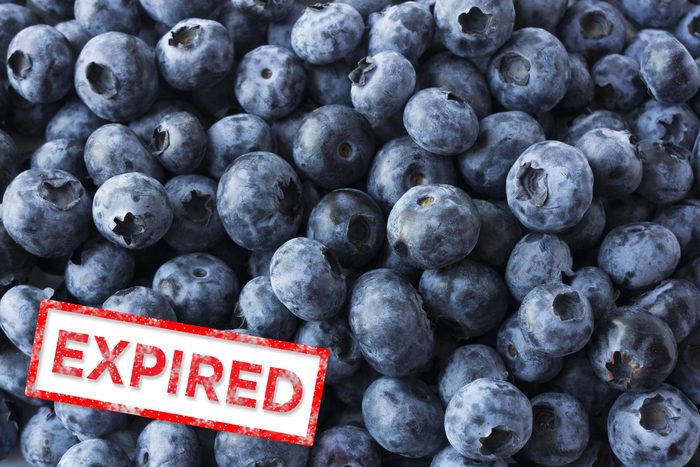
Fresh berries
Whether you get them from the store or a farmer’s market, berries have a short lifespan. Raspberries and strawberries are only good for about three days after purchase, while blueberries can last up to a week, according to FoodSafety.gov’s Foodkeeper app. Pro tip: Freeze any berries you know you won’t eat in that time frame. After that, they turn mushy and become susceptible to growing mold.
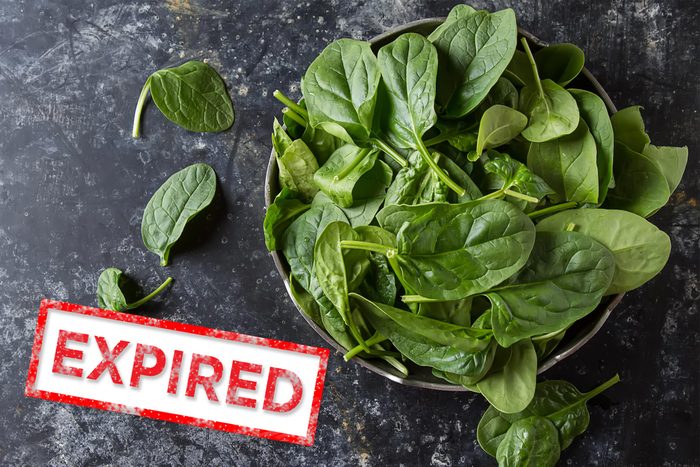
Leafy greens
Yes, even those packaged ones that are pre-washed. Leafy greens still have the potential to carry bacteria like E. coli, so for your safety, never consume greens after any date posted on the bag and eat them up quickly. Why would you want a soggy salad anyway?
How to Make a Vinegar Fruit Wash That Really Cleans Your Produce
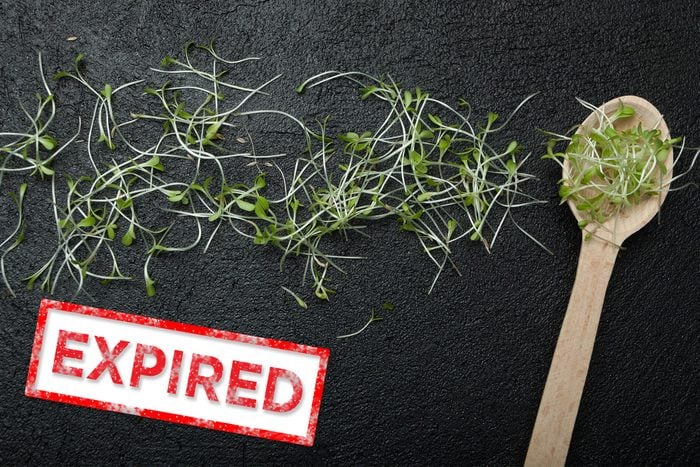
Sprouts
Sprouts are grown in warm and humid conditions, which makes them a potential breeding ground for bacteria right off the bat, according to the FDA. Eat them past their ideal date (about two days after purchase) and your risk of getting sick increases. If you’re pregnant or already sick, avoid them altogether. If you’re healthy and still worried, wash before eating or cook them.
This Is the Healthiest Vegetable, According to a Decade of Research
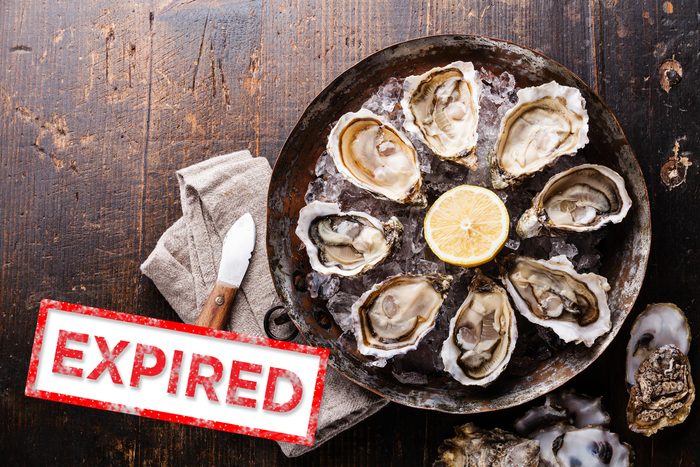
Shellfish
Like other seafood, raw shellfish should be refrigerated pronto before any bacteria can grow enough to cause foodborne illnesses. Clams, mussels, and oysters should be eaten within five days after they are bought, according to the Foodkeeper app, while scallops only last three days tops. If you notice a funky odor from any seafood, throw it out immediately.
